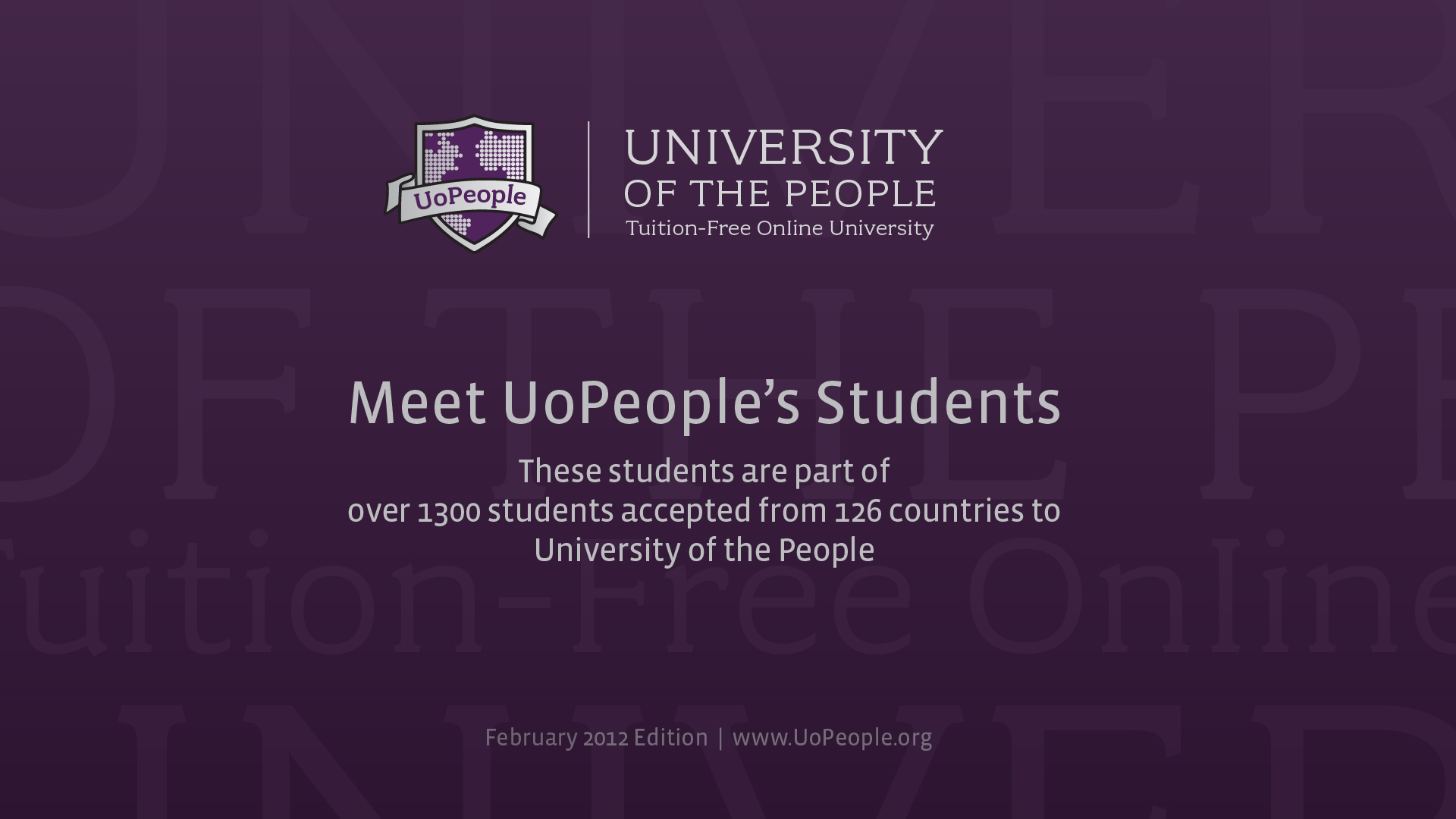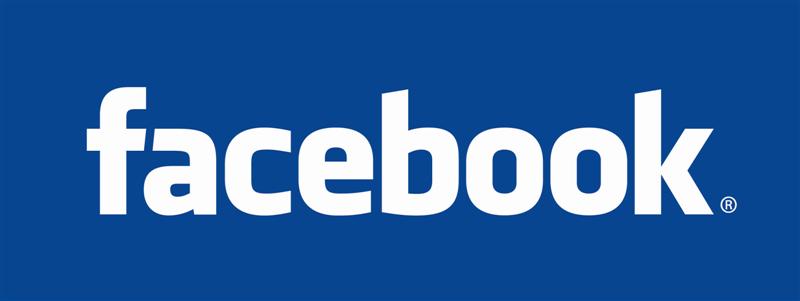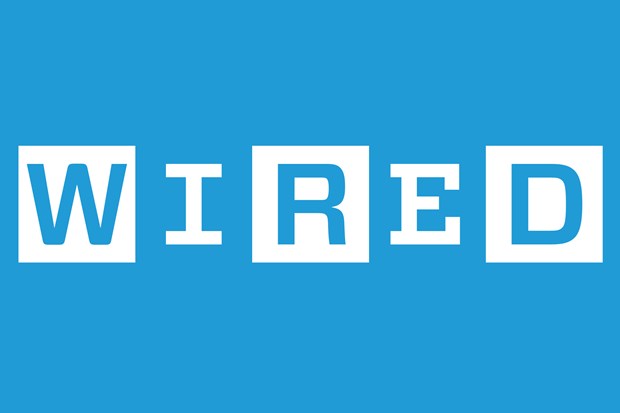|
1,300 Students Accepted from 126 Countries
560,000 Fans on Facebook
UoPeople in the News
| | It is now the second term of our third year and we are very proud to have accepted 1,300 students from 126 countries to date - adding five new countries. As you are aware, we recently completed our first major email fundraising campaign. Our goal was to raise $250,000 and incredibly, we raised just over $350,000! We are so grateful that more people than expected opened their hearts and donated. Thank you all, so much, for your generosity. It is with great pleasure that we also acknowledge reaching more than 560,000 supporters on Facebook and the recent prominent media attention we have received regarding UoPeople's mission.
We could not have reached these achievements without you, and appreciate your continued support as we work towards bringing tuition-free higher education to individuals around the world.
Warm regards, Shai Reshef
Founder & President
University of the People
| 1,300 Students Accepted from 126 Countries Please click the image above to access our latest student presentation. You may also access it here. With the release of this edition of our "Meet UoPeople's Students" presentation, we are pleased to announce that we have accepted more than 1,300 students from 126 countries throughout the world - including new countries of: - Botswana
- Honduras
- Ireland
- Jamaica
- Somalia With each new country we reach, we are bringing higher educational access to another part of the world. Thank you for helping us reach so many countries!
|
|
| | 560,000 + Fans on Facebook! It is incredible, how many around the world embrace University of the People and our mission to democratize higher education globally. The UoPeople Facebook page now has more than 560,000 supporters and every day our number of supporters continues to grow. We are proud of our outreach success and of gaining the support of so many. | The Smart List 2012: 50 People Who Will Change the World
By: Wired UK Staff Published: January 24, 2012 Yossi Vardi -- entrepreneur
selects
Shai Reshef -- educator
Shai has revolutionised the way higher education can be provided to millions of young, capable people in emerging economies. He is using internet tools to provide free online higher education over the net. After having had a successful for-profit career in supplementary education, he is dedicating his life and resources to this new social initiative. He will change the outcome of many youngsters. | A Free College Education for All?
By: Daniel Jelski Published: January 19, 2012 A free college education for all? That’s been the dream of many an idealist. President Obama certainly shares this goal— a year ago he said “The single most important thing we can do is to make sure we’ve got a world-class education system for everybody. That is a prerequisite for prosperity.” State university systems, particularly in New York and California, are tasked to provide all students— even those of limited means—access to higher education. Many, especially on the political Left, view public support of education as a cornerstone of a free and prosperous society. Thus the current economic hard times have produced great distress. Both SUNY in New York and the three California state systems, along with many others, have been forced to dramatically raise tuition. Many states have cut back on support—the sad and familiar joke being that public institutions have gone from being state supported to merely state located. Federal funds are also threatened: graduate students will no longer receive interest deferments, earmarks (a traditional source of money for higher education) are no longer available, and government grant money is increasingly harder to come by. More financial woe looks likely in the near future. On top of this many questions are raised about the value of higher education. Is college teaching what students really need to know? Will it really be able to guarantee graduates a place in the middle class as it has done in the past? Do the benefits of college justify the increasingly burdensome student loan debt that our nation’s youth is now saddled with? Higher education, already unaffordable, may no longer be worth the cost. It all looks pretty grim. And yet I believe we are on the cusp of a new world in higher education – a world that can provide a free (or nearly free) college education for all. The recession has brought higher education’s woes into sharp relief, but it has not caused them. Colleges, designed for the world in the 1960s and 1970s, have not changed with the times. Colleges are still run as top-down bureaucracies rather than bottom-up communities. Outside of government, few other organizations operate this way. Anybody can publish and sell a book at Amazon.com. Google and Apple let their customers determine most of their content. Walmart empowers even its most junior employees to order products and set prices. Wikipedia allows any reader to write or update an article. Higher ed’s institutional structures aren’t like that at all, featuring top-down, inefficient, bureaucratic command management. Maintaining this old-fashioned system is ever more expensive and increasingly impossible. So here are some suggestions for how higher ed can imitate successful organizations, improve quality, and reduce costs even to zero. Let volunteers teach classes: This isn’t simply about saving labor costs (though it is that, too); it is primarily about crowd-sourcing. Just as Amazon, Google, and Wikipedia are able to tap into the expertise of millions, colleges can do the same by blurring the distinction between faculty, student, town, and gown. In an on-line environment there is no limit on the number of classes that can be taught, and no reason to restrict class offerings to only those taught by paid employees. Founded in 2009, University of the People will exclusively use volunteer faculty. Indeed, the distinction between faculty and student is hopelessly blurred in their model. As a result they aspire to be a tuition-free university open to any high school grad anywhere in the world. Initially they are offering programs in business administration and computer science, and are seeking regional accreditation. While there is no tuition, there are some fees, but the total cost for a bachelor’s degree will likely be a few hundred dollars, depending on where you live. By comparison, Texas’ initiative to offer bachelor’s degrees for $10,000 looks like a very modest goal. While UoPeople exists solely on-line, residential colleges can and should take advantage of volunteers. Indeed, classes intended primarily for personal enrichment (as opposed to career preparation) are possibly better taught by volunteers than paid faculty. Who better to teach Shakespeare than somebody whose primary motivation is a love of Shakespeare? Why not empower the waitress down the street (the one with a PhD in English) to teach a class on Hamlet? Just as with Amazon and Wikipedia, crowd-sourcing results in the best coming forward and leading the way. The university will need to establish rules that enable the winnowing and selection process— just as Amazon does very successfully with the customer reviews and the best-seller rankings—without in any way depriving others of opportunity. Of course volunteers may not be grading papers. Some of that can be avoided by asking peers, with instructor oversight, to grade papers (as UoPeople will certainly be doing), but that brings us to the second requirement of a (nearly) free education. Automate almost everything: In particular, automate grading. There are today few reasons for any human being to be grading math or science homework—at least through the sophomore level. Indeed, faculty graders can be unfair and unreliable— I speak from experience. Computer grading can be more reliable and certainly much cheaper. Even for the “softer” subjects computers can be an asset. On-line campuses at minimum run English papers through Turnitin and a grammar- and spell-checker before a grader even sees the paper, eliminating the most tedious labor. But where computerization isn’t possible, grading can be out-sourced. Western Governors University hires graders for whom both the student and the faculty member remain anonymous, and who are required to calibrate their work against other graders to ensure consistency. This is not free, but it is cheaper than faculty graders and almost certainly better. For some classes it may even be possible to outsource grading to India or the Philippines to further reduce costs. With volunteer faculty and computerized/outsourced grading, the cost of many classes can approach zero. But there are still some classes that need to be professionally taught and for which grading is not a primary expense. I’m thinking of the core introductions to the disciplines, such as Intro to Psychology, Calculus, or General Chemistry, etc. How can these be taught more cheaply? Let the winner take all: If my grandchildren ever decide to take calculus, I want them to have an excellent instructor. Indeed, I’d like them to have the best instructor in the country. In times past that would require attending an elite liberal arts college. But today (or more likely, tomorrow) there are more and better choices. These already exist for languages. A quirky company called Rosetta Stone has largely put college foreign language instruction out of business. For approximately $200/semester one can learn almost any language one wants—not quite free, but much cheaper and (apparently) more effective than the college classroom. Rosetta Stone is a good example of winner-take-all; it has cornered the market not because of some government license, nor because only their employees know languages, but because they are better and cheaper. Why not do this with calculus, chemistry, psychology and all the rest? This will eventually happen. In each of those disciplines a product (or, hopefully, two or three competing products) will emerge that is manifestly better than anything any individual college can produce in-house. Why has it not already happened? With foreign languages one can either speak the language or not—a short conversation will test. Whether or not one gets credit for the class is completely irrelevant. The Carnegie Units awarded by academic language departments therefore have no value and are unsellable. With general chemistry, on the other hand, it is much harder to know whether or not the student has actually learned anything—a short conversation won’t do. Therefore the Carnegie Units are still valued, and a general chemistry class that doesn’t come with credit will find few takers. What is needed is a recognized way to establish competence independent of Carnegie Units. Once that happens the winner-take-all world quickly follows. A current project at Stanford University offers a path forward. Stanford is teaching a free, on-line class in artificial intelligence. As of August 15th news reports indicated that 58,000 people had registered. I have a friend who is signed up, and he reports that now enrollment is over 100,000. Stanford is not awarding credit for this class—no Carnegie Units involved. Instead they are doing something much cleverer and much more subversive. Stanford will rank the students in order of how well they do in the class and send them a certificate accordingly. Coming in first in a class of 100,000 will be quite an achievement—worth far more than any Carnegie Units. That person (or more likely, thousand people) will have a credential they can take to the bank. More generally, the organizations that offer world class instruction in the disciplines can keep their own records of how well students do. This will serve as a transcript, rendering the college transcript and the associated Carnegie Units irrelevant and unmarketable. Carnegie Units are a problem, and that brings us to the final suggestion. Break the cartel: What might be called the “Carnegie Cartel” survives because it serves the best interest of existing institutions. Like all good cartels, it reduces competition by raising the cost of entry and by fixing prices. It is enforced by accrediting agencies, appropriately run as voluntary associations of existing institutions, dedicated to keeping newcomers out. Acquiring and retaining accreditation is expensive: including faculty and staff time along with the opportunity cost, a seven-figure price tag for an accreditation visit is not an unreasonable estimate. This does not include considerable efforts spent on on-going assessment, processes for continuous improvement, and collecting all the other ever more arcane documentation demanded by accreditors. A cartel maintains a grip on the market because it controls an essential resource that everybody needs. For the Carnegie Cartel this resource is access to state and federal financial aid—money not available to unaccredited organizations and individuals. But this resource is now threatened by several developments. First, the recession has simply reduced the funds available. Second, many shady for-profit colleges have successfully gamed the system and are now reaping a disproportionate share of funds, corrupting the entire enterprise. Third, the cartel’s currency—Carnegie Units—are no longer a very good proxy for educational achievement. The system is flummoxed by on-line or blended learning, not to mention on-line short courses taught by volunteers. Accrediting agencies have never heard of crowd-sourcing. Finally, and most important, the advent of free or nearly free education eliminates the value of the cartel’s franchise. Federal funds are not necessary. No cartel serves the interest of its customers, and the Carnegie Cartel is no exception. It has frozen an over-priced, outmoded and dysfunctional educational system in place. It needs to be broken up. I believe that is gradually happening now. Breaking the cartel will sharply reduce the cost of higher education across the board. A free college education for all? The UoPeople experiment is testing the free education model today. If it is successful, it will spread more or less rapidly, and even if that particular effort fails it will only be a few years before somebody tries again. So I am not presenting a radical vision for the distant future, but rather describing something that is happening now or very soon. A (nearly) free college education for everybody is not only possible, but likely. But it will be a bare-bones education, and many students will want to pay for something more. What might they pay for? · The residential college experience is valuable even if the general chemistry class is out-sourced. The college can provide accompanying laboratory experiences and/or recitation sections. · Students need a peer group. Classmates form the beginning of a professional network that will last a lifetime. Attending classes and studying together is valuable, even if the classes themselves are free. Peer group facilitators will be in demand. · Some classes— analytical chemistry comes to mind—require expensive equipment along with a technically trained instructor. This will never be free. · College faculty won’t get paid much for teaching, but they can still earn a living as tutors, research mentors, coaches, team-leaders, advisers, counselors. These skills cannot be computerized and students will pay for them. I am in favor of a free college education for all, despite the inevitable dislocation in the higher education community. I hope these changes happen sooner rather than later. But I am not starting a political movement. Activism is not necessary—the die is cast and much of what I predict is already taking place. Not that I’m against political activism—if you want to do that be my guest. But could I ask you to please wait for a few years until after I retire? Daniel Jelski is a professor of chemistry at SUNY New Paltz, and previously served as dean of the School of Science & Engineering. Update: The original version of this piece incorrectly stated that students at UoPeople grade their own papers. | Shai Reshef on Educating the World
By: David D. Burstein Published: December 28, 2011 The good news is that many of us will live to be over 100 years old. The challenge will be--and already is--preparing ourselves for new jobs as technology advances and markets change. This requires workforce training and education on a massive scale. As individuals, we need to continuously develop relevant skills and expertise, build our networks and relationships, and assess our priorities as we look ahead to longer lives in a dynamic world. In the meantime, there are and will be painful disruptions for individuals, families and countries. Entrepreneur Shai Reshef founded University of the People in 2009. Headquartered in Pasadena, California, it is a tuition-free, online university aiming to provide a quality education to people in developing countries. The University has accepted 1,200 students from 121 countries including Vietnam, the Sudan, Indonesia, Nigeria, and Haiti. They have over 550,000 fans on Facebook, making them the second most popular university on Facebook, right behind Harvard. Reshef has just announced a new initiative to "educate the world" for just $6 million. With the already high cost of education going constantly higher in the U.S. and other countries, and a student loan crisis looming for American students, that sounds awfully good. Fast Company: You've launched a new effort to "educate the world" for only $6 million. How is that possible? Especially since we are about to see American student loans go over the one trillion dollar mark in aggregate? Shai Reshef: Currently students at University of the People pay an application fee, which is between $10 and $50 depending on the GDP of their country of residence. Students from poorer countries pay $10 and students from wealthier countries pay $50. If an individual doesn't have the money, then we waive the fee. Each year in addition to the application processing fee, students pay an exam processing fee which ranges from $10-$100 per exam, also depending on the country. So the cost for a full four-year program is $360 on the low end and $4,000 on the high end. $6 million combined with continued processing fees will make us sustainable forever starting in 2015, when we'll have 10,000 students.
We have a very lean operation. We use open source technology and open education resources. We have over 2,000 volunteer professors and our method is peer-to-peer learning. We live in an era where IT--something that used to cost a lot of money--costs practically nothing. We also don't have research or a lot of the facilities other universities have. Think of all the things you are paying for when you go to a big university--buildings and building programs, tenured professors, etc. We don't have those expenses. But what is the quality of the education? How do you maintain a level of academic excellence? Our goal is to open the gates to anyone who meets the minimum standards. We believe everyone should have the chance at higher education. But we also want to ensure that anyone who graduates from University of the People is good enough. Our provost is from Columbia, our deans are from NYU and Emory, and all of our instructors teach at other universities. These people know what quality is. We are definitely offering a quality education, but we aren't trying to be Harvard.
A few months ago I was interviewed by a student from an Ivy League university who asked me if we were the competition, and I wasn't sure whether I should have laughed or if I should have cried. Because if students are choosing between an Ivy League university and University of the People, it means that we've failed. We're not here to be an alternative to Ivy League universities, we are here to be an alternative for people who have no other option to get access to higher education. We hope that this model will be duplicated and adopted by universities and governments of developing countries to educate even more people around the world. We're not reinventing the wheel. We're just taking everything that's out there, wrapping it together and creating a university out of it. Everyone can do this. Although you have real-world professors and other educational elements drawn from many established universities, the format is quite different than in a physical university. What is the experience of going to school at University of the People? In order to be accepted, a student must have a high school diploma and strong English skills. These are challenging requirements. Ultimately, we only accept 3% of the students who start the application process. After they are accepted, students are required to take two introductory courses: English and computer skills. They need to get at least a C+ in both courses in order to be admitted into the program as a regular student. In our program each student takes 30 courses. Each course lasts 10 weeks, each week starts on Thursday and ends the following Wednesday. On Thursday morning, the student wakes up wherever they are in the world and goes into the virtual classroom. In the classroom they see the profiles of all the students in the class, the lecture notes, the reading assignment, the homework, and the discussion question for the week. The discussion question is the core of our study. After reading the material, each student posts a response to the discussion question. So let's say the first student is Chinese, he comes in and comments on the discussion question, the next student is from Indonesia, she comments, then a student from Saudi Arabia comes in and he comments on the discussion question, but he also comments on the Chinese student's comment and so on. None of this needs to be done at the same time.
We purposely don't use audio or video, so that students who don't have broadband access can participate without a problem. As the discussion develops among the students throughout the week, the instructor checks in, guiding the discussion, and answering questions as needed. Every week we expect each student to post at least one original comment and to comment several times on other students' comments. At the end of the week the students hand in their homework, take a quiz, and they get a grade for that week. After 10 weeks they take an exam and they get a grade for the course. Taking an online class is much harder than taking a face-to-face class. Online classes require self-discipline and more attention to your participation. We are a real American university. We have majors and requirements. When a student graduates from University of the People, they should be just like students graduating from any other university. Although you are tuition-free, the admission standards are quite challenging. This must cut out a lot of people. "Educate the world," sounds like more of an aspirational goal than a practical reality, no? This isn't the solution for everyone. And yes, a lot of people cannot meet our standards. At some point we might offer programs that could help people meet our standards. We might also expand into other languages to make it easier for more students. More people need to graduate from high school. Although that's not an area we will work in, I do think our model would work for high school education. Academic advising and connecting students with career options are both very important parts of the college experience. How do you replicate these aspects? We can't offer the individualized advising program that many universities have. We do follow the students' progress and alert them if they are not on track. We're planning on building an online program that will connect students with career resources. Some of these opportunities are already in place. For instance, we have a deal with HP where our students can do online internships with HP. Now we also have a relationship with NYU Abu Dhabi. After the first year of our program, our best students can now transfer to NYU Abu Dhabi and have a physical experience. These are some of the growing number of great opportunities we offer our students. College is also traditionally a place where people build lifelong friends and often relationships for their careers. Considering that you are even more global than the most global physical university, what infrastructure do you have to connect the students and allow them to build relationships outside the classroom? Being tuition-free is very important, so right now we can't invest in that network. We had a petition from our students asking us to build that kind of network where they could connect outside of the classroom. It's happening in some ways on our Facebook page. Communities are forming of our students from different countries. But we definitely want to build that in the future. Ideally this is one network, a network that connects the students amongst themselves, the students with our volunteers and the students with job offers. What is the ultimate opportunity for these students? After the earthquake in Haiti, for example, we committed to take 250 Haitian students and waive all their fees. We worked with three local NGOs, who went into tent cities and recruited students. These NGOs also built a center with good electricity and Internet access, where the students could sit and participate in the classes. The students come every day from their tent cities to the center for four hours. We now have 80 students in Haiti. These are people who live in unlivable conditions, and now they have the chance of a lifetime. It's also very good for their country. After the earthquake a lot of generous universities in the U.S. took in students from Haiti, allowing them to study there. This was great for the students, but it's bad for Haiti. No student will come back to Haiti after spending four years abroad. With our model, since students stay in their home country while they go to school, they are much more likely to stay in their country after they complete our program. In this way we're also fighting the brain drain. Since most of our students are in the developing coun | |
|









0 Comments:
Post a Comment
<< Home